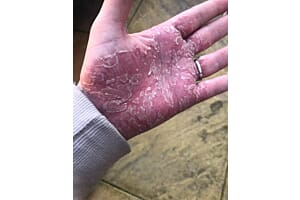New research has found that a specific protein in skin cells, that is a detector and receptor of environmental pollutants such a cigarette smoke, plays a role in the process of psoriasis flare ups.
The protein, called the aryl hydrocarbon receptor (AhR), has been shown to dampen the severity of inflammation involved in psoriasis flare ups and, if stimulated, could be a new treatment option for controlling environmentally triggered psoriasis flare ups.
Psoriasis can be triggered by a number of underlying genetic factors, but environmental pollutants such as cigarette smoke and dioxin can also contribute towards the skin condition as they suppress the production of AhR.
A study published in the June edition of the journal Immunity shows that the severity of inflammation associated with psoriasis is unexpectedly suppressed by AhR.
Until now most drug intervention for treating psoriasis focuses on immune suppressant medications.
However the new study suggests that new drug therapies that focus on stimulating molecules in the actual skin cells themselves may be a more effective way of treating psoriasis when administered in combination with standard immune suppressing therapies.







